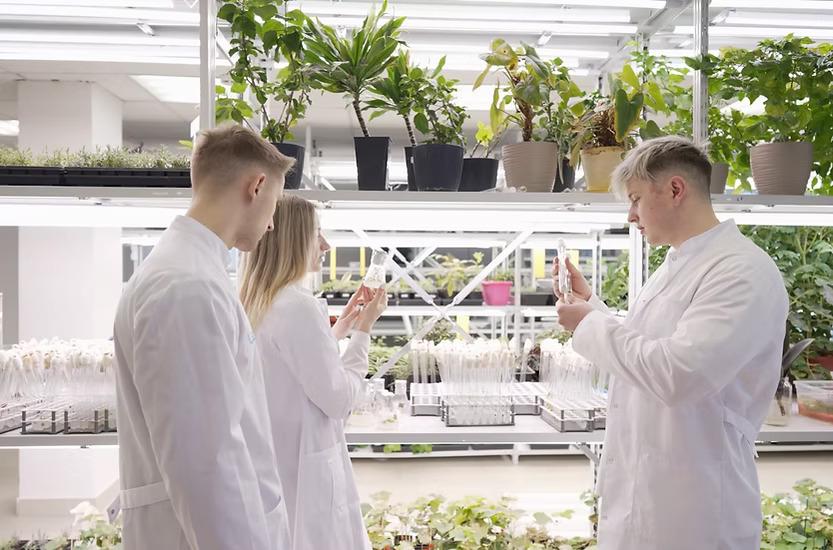The Future of Biofertilizer in UAE’s Food Security Strategy

Introduction: Nurturing Sustainable Growth with Biofertilizer in UAE
As the United Arab Emirates (UAE) moves toward a self-reliant and sustainable future, food security has become a central national priority. With limited arable land, extreme weather conditions, and water scarcity, the nation faces unique agricultural challenges. However, innovation and sustainability are transforming these obstacles into opportunities. Among the most promising developments in this transformation is the growing adoption of biofertilizer in UAE, a natural solution that enhances soil fertility, supports eco-friendly farming, and strengthens the country’s long-term food security strategy.
Biofertilizers are microbial-based products that improve nutrient availability, promote plant growth, and restore soil health without the environmental drawbacks of chemical fertilizers. For a country that imports a significant portion of its food, integrating biofertilizers into national agricultural systems presents not only a sustainable path forward but also a strategic investment in resilience, productivity, and food sovereignty.
The UAE’s Vision for Food Security
Food security is more than ensuring access to food; it’s about building a system capable of sustaining production under any circumstance. The UAE’s National Food Security Strategy 2051 focuses on sustainable agricultural practices, technological innovation, and reduced reliance on imports. A vital element of this vision is improving local agricultural productivity while maintaining environmental balance.
Biofertilizers align seamlessly with this objective. By enhancing soil fertility naturally, they reduce dependence on synthetic fertilizers and minimize harmful runoff that affects groundwater and marine life. In doing so, they address both food production and environmental sustainability—two cornerstones of the UAE’s long-term development plan.
Challenges in UAE Agriculture and the Role of Biofertilizers
Agriculture in the UAE faces several challenges that require smart and adaptive solutions:
-
Soil Degradation – The desert soil is often sandy, nutrient-poor, and lacking in organic matter. Traditional chemical fertilizers offer short-term yield boosts but worsen soil health over time. Biofertilizers, on the other hand, work with beneficial microorganisms to rejuvenate the soil naturally.
-
Water Scarcity – The UAE’s climate offers limited freshwater resources. Biofertilizers help plants develop stronger root systems, improving water uptake efficiency and enabling crops to thrive with less irrigation.
-
Dependence on Imports – A large share of fertilizers and food products are imported. Promoting domestic production and use of biofertilizers supports local industries and strengthens agricultural independence.
-
Climate Change – Rising temperatures and erratic rainfall patterns threaten food production. Biofertilizers help crops become more resilient to stress, improving yields even under adverse conditions.
By addressing these challenges holistically, biofertilizers are emerging as a cornerstone of agricultural transformation in the UAE.
Understanding Biofertilizers: Nature’s Agricultural Ally
Biofertilizers are living organisms—such as bacteria, fungi, and algae—that enrich soil fertility by fixing atmospheric nitrogen, solubilizing phosphorus, and stimulating plant growth through the synthesis of natural hormones. Unlike chemical fertilizers that merely supply nutrients, biofertilizers activate the biological processes within the soil, making nutrients available naturally.
Key types include:
-
Nitrogen-fixing Biofertilizers: Convert atmospheric nitrogen into a usable form for plants.
-
Phosphate-solubilizing Biofertilizers: Help plants absorb phosphorus more effectively.
-
Mycorrhizal Fungi: Enhance root growth and water absorption.
-
Compost-based Biofertilizers: Enrich soil with organic carbon and beneficial microbes.
In the UAE, where soil fertility is a major concern, integrating these biological solutions can drastically improve crop performance and reduce input costs over time.
Integrating Biofertilizers into the UAE’s Food Security Framework
The UAE’s food security strategy emphasizes innovation, technology, and sustainability. Here’s how biofertilizers contribute directly to that mission:
1. Sustainable Productivity
Biofertilizers enable continuous crop production without depleting soil health. Over time, they help create self-sustaining soil ecosystems, allowing farmers to reduce reliance on imported chemical inputs while maintaining yields.
2. Environmental Conservation
Unlike chemical fertilizers that often lead to water pollution and soil acidification, biofertilizers maintain ecological balance. Their use reduces greenhouse gas emissions and prevents toxic buildup in the environment—a critical factor for desert ecosystems like the UAE.
3. Local Manufacturing Opportunities
The UAE’s focus on industrial diversification includes opportunities for local biofertilizer production. Developing domestic biofertilizer facilities can create jobs, reduce import dependence, and encourage research in agricultural biotechnology.
4. Smart Agriculture Integration
Modern farming in the UAE increasingly leverages hydroponics, aquaponics, and vertical farming. Biofertilizers can be integrated into these systems to provide a natural nutrient source while minimizing synthetic input costs.
5. Resilience to Climate Change
Biofertilizers enhance plant tolerance to environmental stresses such as heat, salinity, and drought. This is crucial for ensuring consistent food supply under changing climatic conditions.
Technological Innovations Driving Biofertilizer Development in UAE
The future of biofertilizers is deeply connected to biotechnology and precision agriculture. Advanced microbial research is helping identify native strains of beneficial microorganisms that thrive in arid environments. The UAE’s scientific community is exploring innovations such as:
-
Microbial consortia that combine multiple beneficial bacteria and fungi for enhanced performance.
-
Bio-encapsulation techniques that protect microorganisms from harsh desert conditions.
-
Integration with AI and IoT for monitoring soil microbiome health and optimizing biofertilizer application.
These innovations not only increase the effectiveness of biofertilizers but also make them more adaptable to the UAE’s unique agricultural landscape.
Economic and Strategic Benefits of Biofertilizer Adoption
From an economic perspective, biofertilizers offer long-term savings compared to synthetic fertilizers. While initial transition costs may be higher, the benefits accumulate over time through improved soil fertility, reduced water consumption, and higher-quality yields.
Strategically, promoting biofertilizer use contributes to national resilience by:
-
Reducing agricultural dependency on imports.
-
Encouraging local production and innovation.
-
Supporting the UAE’s broader sustainability and green economy goals.
As global markets increasingly value sustainable products, UAE-grown crops cultivated with biofertilizers may also enjoy a competitive edge in international markets that prioritize eco-friendly sourcing.
Educating Farmers and Raising Awareness
For biofertilizers to reach their full potential, awareness among farmers and agribusinesses is essential. Educational programs, research partnerships, and pilot projects can demonstrate their practical benefits. Training farmers in proper application methods, storage, and timing ensures optimal performance.
Public outreach initiatives can also help change perceptions—highlighting that biofertilizers are not a substitute for productivity but rather an enhancement that promotes long-term soil and food health.
Policy and Government Support
Government support plays a crucial role in mainstreaming biofertilizer use. Encouraging policies may include:
-
Subsidies or incentives for adopting sustainable agricultural inputs.
-
Certification programs to ensure quality control.
-
Research funding for developing region-specific biofertilizer solutions.
-
Public-private partnerships to scale up production and distribution.
Such measures can accelerate the integration of biofertilizers into UAE’s agricultural ecosystem, ensuring both short-term productivity and long-term sustainability.
Looking Ahead: The Road to 2051
As the UAE looks toward achieving its food security goals by 2051, biofertilizers will play an increasingly significant role in shaping agricultural resilience. The combination of innovation, policy support, and public awareness will determine the speed and scale of this transformation.
The coming years are likely to witness:
-
Wider adoption of biofertilizers across traditional and high-tech farms.
-
Increased local research on desert-specific microbial strains.
-
Integration of organic and biological fertilizers in national agricultural policy.
-
Collaboration between scientific institutions and farming communities.
If implemented effectively, these steps could redefine the UAE’s position as a regional leader in sustainable food production.
Final Thought: Cultivating the Future with Organic Fertilizer UAE
The UAE’s journey toward food security is deeply rooted in innovation, sustainability, and environmental responsibility. Biofertilizers represent a natural bridge between advanced technology and ecological balance—one that enhances productivity without compromising the environment. Companies like uTerra Middle East Agro Industries play a pivotal role in this transformation by promoting the use of organic fertilizer UAE and integrating biological inputs into modern farming systems. Through such initiatives, the nation can ensure healthier soils, higher yields, and a sustainable food supply for generations to come. As the UAE continues to build a resilient agricultural ecosystem, biofertilizers stand out as both a practical solution and a symbol of its commitment to a greener, self-reliant future.




